Remittance Girl's Blog, page 36
February 5, 2012
Distant Shores
You dream
yourself
bound in meaty
ribbons of my
feminine vapours,
steaming in
the hothouse
of my cunt.
To keep me
in your
mind's eye,
you fuck
the cold sea
between us.
It is only
the prospect
of your
inevitable
ejaculation
that keeps
you warm.
We will always
be separate.
You cannot curl
in upon yourself
anemone-like.
Where you spend,
I conserve
swallowing
the whole
hole of my
pleasure
enraptured
musculature of
my induction.
I do not spurt
or need to add
to the failed
posibilities.
Your desperate
attempts to
avoid death
in my womb
are futile.
Nothing grows here
but what I allow.
And I will nurture
no more versions
of you.


February 2, 2012
Doing Good while Being Bad: Coming Together's Share the Love – #comingtogether
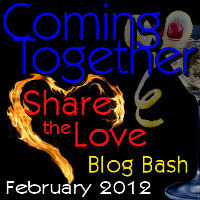 All this month, Lisabet Sarai is hosting a series of posts by writings who have participated in and contributed to the 'Coming Together' Project. Coming Together is the brain child of Alessia Brio who, six years ago, came up with the idea of publishing excellent erotic writing for charity. If you'd like to read more on the origins of the project and Alessia herself, please click here, or on the badge.
All this month, Lisabet Sarai is hosting a series of posts by writings who have participated in and contributed to the 'Coming Together' Project. Coming Together is the brain child of Alessia Brio who, six years ago, came up with the idea of publishing excellent erotic writing for charity. If you'd like to read more on the origins of the project and Alessia herself, please click here, or on the badge.
Below is a list of each of the Coming Together contributors and the date they'll be publishing their post. Oh, yes, I'm in there like a dirty shirt, on February 3. My charity was the ACLU.
1st – Alessia Brio
2nd – Lisabet Sarai
3rd – Remittance Girl
4th – Heather Lin
5th – Ann Regentin
6th – Victoria Blisse
7th – Lisabet Sarai
8th – Sacchi Green
9th – Gia Blue
10th – Xan West
11th – Erobintica
12th – Andrea Dale
13th – Jean Roberta
14th – Nobilis Reed
15th – Robert Buckley
16th – Brenna Lyons
17th – C. Sanchez-Garcia
18th – Amelia June
19th – M. Christian
20th – Teresa Lamai
21st – Tilly Greene
22nd – Giselle Renarde
23rd – Aliyah Burke
24th – Annabeth Leong
25th – Raziel Moore
26th – Allison Wonderland
27th – Gayle C. Straun
28th – Daniel Burnell
29th – Lee Benoit
There are prizes to be won and e-books to give away, including my novel The Waiting Room. Please join us, comment, blog it, and support the wonderful selection of personally chosen charities. And remember, cold charity is Dickensian, but hot charity is Coming Together.


January 28, 2012
Accidentally Kinky
Michel Perkins introduced his unique survey of modern erotic literature with George Bataille's incisive quote: "Man goes contantly in fear of himself. His erotic urges terrify him."(Perkins 1992). What serious novelist would deny themselves such a challenge as a topic? Yet most contemporary literary writers do, either by refusing to write about the sexual lives of their characters at all, or by representing those urges in spectacularly unerotic ways.
As one literary critic observed, "By the early 1990s, a peculiarly British form of disapproval had grown out of the notion that sex and serious literature made for uncomfortable bedfellows."(Akbar 2010).
In his interview with the Washington Post's Carole Burns, Martin Amis has famously said: "Good sex is impossible to write about" because " you lose the universal and succumb to the particular."(Post 2003). I find this an almost impenetrable statement. Either he means that no good literature ever deals with 'the particular' – which is a patently untrue statement. Or he means that 'good sex' is somehow less universal than bad sex. One has to wonder whether he's simply coming up with badly formed excuses for his own limitations, or he has personally suffered a very bad sex life.
Howard Jacobson, in responding to critics who complained that his novel, 'The Act of Love,' did not arouse them, he said that it wasn't his intention to do so (Akbar 2010). But, in fact, there are certain portions of Jacobson's book that would indeed be extremely arousing to any fetishist turned on by humiliation and/or domination (Jacobson 2010).
It's not that literary novelists aren't writing about sex. According to James Wood, "Houellebecq has become famous both for the pornographic fervor of his writing and for the theorizing he likes to do around his sex scenes" but his are not, it could be argued, representations of naturalistic eroticism (Woods 2012). Quite the opposite: they are perhaps an extreme example of how many contemporary literary writers have resigned themselves to writing about sex.
There is a sense that sex can only be written about 'authentically' when it is represented devoid of emotion or even self-reflection on the part of the characters. It must be portrayed with dispassion, mechanistically else it devolve into "erotica, with its cheapening effect of sexual arousal" (Akbar 2010).
It is ironic, then, that this studied avoidance of emotional, ethereal or passionate sex scenes has in fact led to literary sex scenes that are either totally absent or hyperpornographic: lacking depth, humanity or context. The artificial and mannered decision to ensure that the reader's experience is not cheapened by sexual arousal has, in fact, led to acclimatizing them to sexually fetishistic extremes: depersonalization, humiliation and extreme emotional disengagement. Very much in the same way that the Victorian sublimation of sex led so unsurprisingly to erotic strategies that now dominate the world of kink, such as erotic power relationships and sexualized corporal punishment.
It's all very well for Amis, Jacobson and Houllebecq to publically rue the commercialization and trivialization of sex within our culture, because this is an undeniable social reality (Attwood 2009), but why do they insist not only on representing it, but also perpetuating it?
____________________
Akbar, A. (2010). "Bad sex please, we're British: Can fictive sex ever have artistic merit? ." The Independent. Retrieved Jan 28, 2012, from http://www.independent.co.uk/arts-ent....
Attwood, F. (2009). Mainstreaming Sex: The Sexualisation of Western Culture. London, I B Tauris & Co Ltd.
Jacobson, H. (2010). The Act of Love. London, Vintage.
Perkins, M. (1992). The Secret Record. New York, Rinoceros.
Burns, Carole. (2003). "Off the Page: Martin Amis." Off the Page. Retrieved Jan 28, 2012, from http://www.washingtonpost.com/wp-dyn/....
Woods, J. (2012) Off the Map: Michel Houellebecq's naked nomads. The New Yorker 78


January 22, 2012
On Pornography: Towards a revised definition
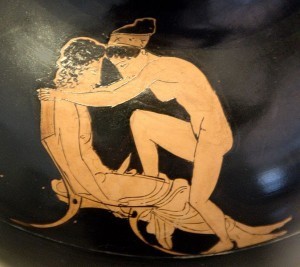 I've complained a great deal about the way in which all sexually explicit material of any sort is called 'pornography'. And I've often insisted that what I write is not pornography. Because of this, I often worry that I leave my readers with the impression that I am anti-porn. I want to stress, categorically, that this is not the case. However, I think the definition and usage of the word of 'pornography' is problematic. We are careless about how we define it and the way we use the word as a blanket term for all sexually explicit material. So, I'd like to start in a very dry way. A definition, please:
I've complained a great deal about the way in which all sexually explicit material of any sort is called 'pornography'. And I've often insisted that what I write is not pornography. Because of this, I often worry that I leave my readers with the impression that I am anti-porn. I want to stress, categorically, that this is not the case. However, I think the definition and usage of the word of 'pornography' is problematic. We are careless about how we define it and the way we use the word as a blanket term for all sexually explicit material. So, I'd like to start in a very dry way. A definition, please:
pornography, n.
Etymology: < Hellenistic Greek pi (adjective) that writes about prostitutes ( < ancient Greek pi- (see porno- comb. form) + – -graph comb. form) + -y suffix3 (compare -graphy comb. form), perhaps after French pornographie treatise on prostitution (1800), obscene painting (1842), description of obscene matters, obscene publication (1907 or earlier).
1.
a. The explicit description or exhibition of sexual subjects or activity in literature, painting, films, etc., in a manner intended to stimulate erotic rather than aesthetic feelings; printed or visual material containing this. 1
This is the OED entry, and definition (a) is the one which most people use. I find the very definition to be problematic because I challenge the distinction between 'erotic' and 'aesthetic' feelings. Many feelings regarding representations of desire and pleasure are often both erotic and aesthetic. Also, inherent in the definition is an implication that erotic feelings are shallow and aesthetic feelings are deep.
I find it helpful to reach back to the etymology of the word from the ancient Greek porno-graphos: writing about prostitutes. It allows me to draw a broad distinction between the commercial and non-commercial arenas of eroticism. So this is where I'd like to draw my philosophical line. My working definition of pornography is any material – written, photographic, filmic or interactive – that involves the exchange of money for material solely produced to elicit sexual arousal. And, I'd like to include in this any material that attempts to mimic pornography: i.e. certain types of amateur porn in which memes common to commercial pornography are obviously present.
Why do I focus on the 'commercial'? Am I simply anti-capitalist?
No. Please don't get me wrong. Sex has always been a commodity. Sexual gratification could always be purchased for a going rate in almost every society throughout history. I don't, on principle, have anything against it.
However, the involvement of money brings the transaction into the public arena. Money, by its nature, is a public thing. Something that can be purchased for money is a product in the marketplace, and entails the civic and legal attributes that all public affairs do. The minute anything is 'for sale' is the moment it begs to be judged on solely economic terms. We can begin to discuss fair market value, value for money, fair exchange. Marketized sex becomes, then, fundamentally quantifiable. If I pay for an hour with a prostitute but do not have an orgasm, I have a right to complain that I did not get what I paid for. If I purchase a porn video but it doesn't arouse me enough to facilitate masturbation, I can complain that it wasn't worth the money. Quantification has an interesting effect of decontextualizing whatever is being quantified.
What I find particularly problematic is that so many people have a problem keeping the paradigms straight in their heads.
A prostitute exchanges sexual pleasure (to their client) for money. They get the money, their clients get the pleasure. Porn movies make products to sexually arouse their clients in exchange for money. The actors in porn films get paid. They have sex that is recorded and consumed by others for a fee. Pornographic magazines take pictures of sexually arousing situations and sell copies of the magazine. There is no mutuality of pleasure involved here. There is a transaction of pleasure for money.
It may be in the marketing interests of many types of commercial sex retailers (prostitutes, pornographers, strippers, cam-sex providers, etc.) to pretend that what they are doing involves mutual pleasure (and at times, it even might be true) but the fundamental structure of the transaction an economic one. Otherwise, they would not be in business.
People who have sex together, or get each other off, without the exchange of money are working on a different paradigm. It may indeed be just as transactional – pleasure for pleasure, pleasure for affection, pleasure of admiration – but it is fundamentally private because it doesn't involve the transfer of capital.
This also means that, because money is not involved, the experience doesn't naturally devolve into the quantifiable, which means it's less likely to be decontextualized.
So, although I do write extremely explicit material at times, and there are portions of my writing that are written to be arousing to the reader, it is never pornography. Because I do not write erotic fiction for money.
'Aha!' you say, 'but you sell your books! Your stories appear in anthologies that are for sale!' This is true enough. My work may end up in an object that can be purchased for money, but its birth was never predicated on the payment of money. I did not write it for the purpose of receiving money for it. No piece of work I have subsequently had published has not first appeared on my blog for free. So, if you've been my textual lover by visiting my blog on a semi regular basis, you have had the opportunity to consume everything I've ever written, free.
I have stumbled across readers who are so used to seeing their own sexual arousal as transactional, that they leave nasty little comments about how something I wrote didn't turn them on and they've 'wasted' their time. They are so used to viewing sex within an economic model, that even a reading experience that is absolutely free must, somehow, represent 'good value for money' to them, even when no money is being exchanged.
For a very long time, I've tried to understand why I write and post my work. At it's most basic, it might easily be described as a form literary exhibitionism. I write to be read in the way some women take off their clothes in public for the pleasure of being looked at. But I'm not, by nature, an exhibitionistic person. In fact, quite the opposite: I am essentially voyeuristic.
So, it is a bit more complicated than that. If being read was my only goal and gratification, I could write much more explicit and immediately sexual things. I'd have a far larger readership. Being 'read' is not enough for me. I need to feel you are engaging with me over the landscape of the story.
It is rare that I write anything that does not, at its core, have questions attached: why is this erotic to us? How does desire come to constitute our sense of self? How does pleasure/pain become a transcendental experience? Where is the line between rage and lust? The list of questions I am asking in my fiction goes on and on. Sometimes I proffer possible answers, sometimes I don't. But there is an intense gratification for me in the communion I feel with readers when I know we are both drawn to and perplexed by these questions. It is a type of pleasure I feel. Especially when readers comment.
"pornography, n.". OED Online. December 2011. Oxford University Press. 22 January 2012 . ↩


January 19, 2012
Kiss Me
Kiss me
without reservation
or calculation
or malice aforethought.
Kiss me
like a drowning man
gasps for air and
takes in water.
Kiss me
with your body
beheaded, reaching
for that one sublime moment.
Kiss me
blind and deaf and dumb,
the Helen Keller Kiss
of all time.
Kiss me
along signals
of chemistry and
the surge of my bloodstream.
Don't ask
don't think
don't wait
just kiss me.


January 17, 2012
Remittance Girl Gone Dark: #SOPABLACKOUT #SOPA 24 HRS EST
January 15, 2012
It's All About Mickey Mouse: SOPA and the reality of cultural production
Someone asked me to explain why I'm blacking out on January 18th.
I'd like to be upfront about this: it is not simply the SOPA bill that I oppose. It is the entire way in which the concept of intellectual property has evolved.
The US Constitution was one of the few national documents to enshrine the concept of copyright into its founding documents, and here is the part that counts: "To promote the Progress of Science and useful Arts, by securing for limited Times to Authors and Inventors the exclusive Right to their respective Writings and Discoveries."
Why for a 'limited time"?
Because very wise people, who were themselves creators of both scientific and cultural content, understood that we do not create in a vacuum. That, although it is practical and ethical to ensure that authors and inventors should have a monopoly to benefit from their for a period of time, a vibrant culture needs soil to grow in. The public domain is the soil from which new cultural work grows.
Go take a browse through gutenberg.org or archive.org. All those 'original' pieces of cultural wealth are based on others. If Shakespeare or Emily Bronte were writing today, they'd be too busy fighting off lawsuits to produce anything. The truth is that none of us have utterly original thoughts. We feed off each other. Culture IS, in many ways, remix.
I support a very limited and once-renewable copyright law. 14 years with the option to renew for another 14. After 28 years, I'm very happy to see my work go into the public domain and become fertilizer for the next generation of creatives.
The truth is, the people who are lobbying hard for SOPA and other bills like it don't give a shit about anything other than their profits. They have no respect of the creators of the works they act as middle-men for. They don't care if what they want results in the production of new creative works grinding to a halt. They will be happy to keep selling you old Dan Brown books with new covers and reissues of Lady Gaga until the cows come home.
Why do I know this? Well, consider this: next time you buy a song off iTunes, consider that the credit card company you put the transaction through earns a higher percentage of that sale than the artist whose song you're purchasing does. That's the reality.
So. What can you do about it?
Please do not support legislation like SOPA. Please do not support legislation that extends copyright times to benefit the middlemen rather than the creatives who produced the work. When possible, please purchase creative works from the independent and small companies that release them and cut the middlemen out. And please respect the legitimate and legal copyright of creatives whenever it is possible for you to do so. Notice I qualify that? It's because I don't believe that publishers should be able to hang onto the copyright of books they have allowed to go out of print. If they can't be fucked to make it available for money, then they don't deserve to sit on that work in virtual perpetuity. The rights should revert back to the author, or where the author is dead, they should go into the public domain.
For more on these issues, read Jessica Litman's Digital Copyright (available free as a PDF download), Julie E. Cohen's The Place of the User in Copyright Law , a wonderful TED talk by Lawrence Lessig: Laws that Choke Creativity , James Boyle: The Public Domain – Enclosing the Commons of the Mind and finally, and brilliantly, a look at how the mythology of how copyright might not be as economically beneficial to authors as is commonly assumed: Michelle Boldrin's 'Against Intellectual Monopoly'.
All of these texts are downloadable free or readable online.


January 14, 2012
Body Art/Work/Action #temptingfailure
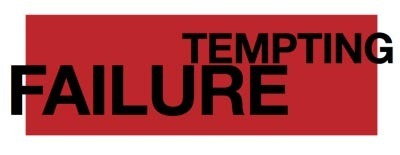 When I was six, I was taken to the opening of an art exhibit at a gallery. This is how I was taught how to experience art: you walk into the space, grab a glass of wine, stand in front of pictures, nod, leave. Very often, the work hanging on the wall has no intrinsic meaning for you. Here you are confronted with a canvas awash in several colours you don't like. Or perhaps it is a vaguely figurative work, and you silently guess what it might be. (After all, you don't want to be wrong). Perhaps you tilt your head. For the longest time, you think that art is a guessing game, a sort of high-brow 'Where's Wally?'. Just as you think you've spotted a brown dog in the corner of the canvas, someone ruins your day by telling you that this work can't only be appreciated in the context of the canon of all the Western Art that's come before it and the history of the artist's own previous works. At that point, most people either give up going to art galleries, or just go for the bad wine.
When I was six, I was taken to the opening of an art exhibit at a gallery. This is how I was taught how to experience art: you walk into the space, grab a glass of wine, stand in front of pictures, nod, leave. Very often, the work hanging on the wall has no intrinsic meaning for you. Here you are confronted with a canvas awash in several colours you don't like. Or perhaps it is a vaguely figurative work, and you silently guess what it might be. (After all, you don't want to be wrong). Perhaps you tilt your head. For the longest time, you think that art is a guessing game, a sort of high-brow 'Where's Wally?'. Just as you think you've spotted a brown dog in the corner of the canvas, someone ruins your day by telling you that this work can't only be appreciated in the context of the canon of all the Western Art that's come before it and the history of the artist's own previous works. At that point, most people either give up going to art galleries, or just go for the bad wine.
My first encounter with performance art – specifically body art – was in the late 80′s. Encounter is really the wrong word. It was more of an intrusion. Lacking money, I was living in a cockroach infested room off the mezzanine floor of an artist-run gallery. I woke up, after a drug-addled evening, to find a woman slapping on strips of cheap flank steak onto her naked body in front of an audience. Then she sewed herself into it with a large needle and thread. And I noticed, that she wasn't too careful about whether she was just joining the pieces of meat, or her own skin. She hadn't just made herself a meat suit – she'd attached it to herself in paces with sutures.
The first thing I noticed was the scent of the bloody meat, which was strong, in that sweet, nausea-inducing way meat sometimes smells. Then there was the fact that it was winter and I wondered what all that cold, wet meat must feel like on her body. Of course, the meat got warm in contact with her skin and that made the smell worse. As I stood there, looking over the mezzanine banister, I realized – oh, my god, she's meat. She's all meat. She's nothing but meat.
Body Art is a type of performance art where the artist uses their own body as the canvas. It's always live, never exactly the same twice, and always meant to confront you, not only on an intellectual level but a visceral one as well. Because how you experience it as an audience member is part of the art, as is the space it happens in. You don't need to come with a thorough knowledge of the canon of Western art, or even know what the artist might have done before. All you need to do is be willing to come and be the essential empathic body-wearing human you are.
Truly, if you can't get past the 'ick' factor, then you're missing a lot. For me, being an audience member at a Body Art action (they often call them 'actions' as opposed to 'performaces' to make the point that this isn't theatre), the important thing is to be able to do what comes very naturally and imagine being in the body of the artist.
Body Art often asks you to reconsider how you see the body – theirs, yours, ours. Skin, muscle, bone, blood, bruising… We live in our bodies, wear them, use them, experience the world through them. They are the visual and visceral proof of our existence. And yet they are so much more. Symbols of so many, many things. Our culture tells us how to treat our bodies. How to see it, how to depreciate it or venerate it. How to be in it. When to share it and when to keep it separate.
Most Body Art interrogates and confronts one or more of those aspects of our relationship with our bodies.
On March 4th, I'm going to be in London attending Tempting Failure, a series of actions curated by Thomas John Bacon, at the ]performance s p a c e [ . Please consider coming. If you've never seen Body Art/ Live Art before, you really are in for an incredible experience. I'll update you closer to the time as to logistics and how to get tickets. Meanwhile, you can follow on twitter, via the hashtag #temptingfailure and the Facebook page. And, if you're feelin' a little nervous, we can hold hands.

Thomas John Bacon is a live artist whose work focuses upon the conception of the body, Being and a multiplicit Self. In the build up to the forthcoming premiere of his Triptych, he has curated an evening which seeks to engage with the role that sacrifice may play for the artist who challenges their practice or Being in the production of the living artifact: Be it via physical means or through a sense of exposure. Be it metaphorical or actual. And most importantly, be it through the risk of failure. Tonight's series of live art & transgressive performance from professional artists based across the UK has been selected by Thomas John Bacon to each uniquely engage with a shared ethos; to tempt failure.
www.thomasjohnbacon.com
@thomasjohnbacon

Version 2
In a continued [s]exploration into dissent, cause & effect, Version 2 moves into a controlled demolition of two connected bodies through an abstracted veil of Minimal Drag/Gender blurring and blunt force movement.
"You are young and beautiful darling and you deserve the best things in life…but you weren't young and beautiful tonight" – Crystal Labeija
Kris Canavan & Nick Kilby
notesoncruelty.blogspot.com
@nkilby9932
www.kriscanavan.com
@kriscanavan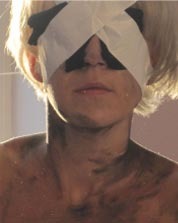
the space between you and me
Exploring intimacy, survival and reparation the performance is a process of revelation; peeling away the layers, searching for 'bare life', the air pocket between the wall and the wallpaper… the space between you and me.
Helena Sands
www.sandsh78.blogspot.com
@hsands
The King of Beauty
While life thrives, beauty seems to fade – a fact that the King of Beauty can't come to terms with. In a bid to preserve his appearance, he eats lipstick to fill the emptiness inside. As time goes by, he realises quests born of vanity are unfulfilling, empty and solitary.
Allan Taylor
www.allanstanleytaylor.com
@Allan_Taylor
Hand In Glove
Intercutting male bodybuilding poses with the charges of heraldry. An exploration of looking and being seen, the performance references Lacanian theory, and ideas around disgust and display.
Mark Leahy
www.markleahy.net
@gmarkleahy
[deletia]
a romantic ritual exploring the aftermath of failed romance, using the body as the canvas in acts of memory, pain and tenderness.
Hellen (aka Traumata)
www.traumata.org
@Traumata
Tracing the Pathway
Glancing Back is a series of participatory interventions engaging audience members in a documentary mapping of bodies in space. Concretising what is missing by focusing on what is first present, we seek a collaborative and embodied approach to archival lacunae.
Cara Davies, Joseph Dunne, Mads Floor Andersen & Rosanna Traina
tracingthepathway.wordpress.com
@TracingPathways
Laced
Lace, thread, slide, feed them close together, in and through the other. Lace. Pull, bring white to the finger tips, stretch and strain the spine. Lace.
Complete, repeat and return.
Holly Johnson
@johnson_holly1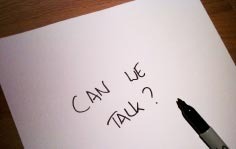
baby wears a balaclava
Written on the piece of paper is a request, an instruction, a desire, a revealing anecdote, a possibility, a fragment, a frustration, an encounter, a beginning and an end…
Tim Bishop
@timmybishop
Spitting Distance
I am broken, and just like my Dad did, I want you to make me better again through the polysemous act of spitting.
Mark Flisher
www.markflisher.co.uk
@MarkFlisher
Failure to COMMUNICATE
Madness – Somewhere within it lies sancitity, reasoning and
sound thought {Sound} Thoughts without names from past masters.
Taylor Le Fin
idlevault.blogspot.com
@TLeFin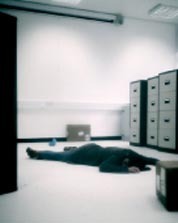
True Love Waits
A durational participatory project engaging with cycles of boredom, play, improvisation and space making. with no intention towards or expectation of an outcome; a non-verbal something out of nothing.
daniabulhawa.wordpress.com
@skeeterdani
Sardonik Grin
Sardonik Grin is the live sound scuplture project of Llewyn Máire (kabbage23, Try My Cabbage, gyrl grip).
A previous sound collaborator on the Traces of Being project with Thomas John Bacon, Llewyn Máire brings a wonderful live sound to the evening. Thriving in the liminal spaces of gender, culture, life and death, Máire's work seeks to expose, challenge and explore the constructs of identity, the mediation of socio-cultural experiences, and the influence of power.
January 13, 2012
Dark on the 18th
 This is just a little note to let you know that my site will be participating in the 8hr blackout in support of the anti-SOPA movement.
This is just a little note to let you know that my site will be participating in the 8hr blackout in support of the anti-SOPA movement.
I passionately support the intellectual property rights of creative artists. But I do not support the agendas that lurk behind the current SOPA bill.
I thank you in advance for your forbearance and I hope you will join me. There is a very nice, easy to install WordPress Anti-SOPA plug in. I hope you will consider installing it.


My First (and perhaps last) ERWA Blog post
So, today was the first of my monthy ERWA Blog posts. It may very well be my last when my co-bloggers are confronted with 2000 words of density. We'll see.
Anyway, I've been blogging a lot lately about the lack of well-written or arousing sex scenes in literary fiction, and musing over the possible reasons writers might purposefully chose to represent sex this way. The ERWA post goes on look in depth at what, according to reader-response theorists is actually taking place in the mind of readers as they read. And, taking that into account, some strategies for triggering lived as opposed to mediate sexual memories in the reader's mind.
Please hop over and have a read: Writing Erotic: lived vs mediated experience
Also, while you're there, read Ashley Lister's very good practical post on writing exercises. It's excellent!







